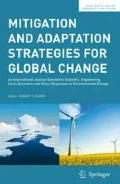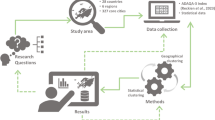Abstract
Multilateral support through programs like the Least Developed Countries Fund (LDCF) targets countries widely considered to be the most vulnerable to climate change. Cambodia is one of the six Asian LDCF recipients and with UNDP support is implementing the first adaptation project to arise from its National Adaptation Program of Action. Drawing on primary research conducted in August 2010 through interviews with key stakeholders, this article investigates the project for the likely benefits and challenges it will face in promoting institutional, infrastructural, and community resilience to climate change impacts. We find that the country’s ongoing decentralization reforms offer an effective opportunity to mainstream climate change planning into sub-national government operations, but that competing priorities for immediate investment in education, roads, and healthcare may prevent government officers from sustaining a focus on preventative adaptation measures. We conclude that through careful planning, water resources infrastructure and agricultural practices can be designed to withstand climate variability and avoid the need to replace or rehabilitate systems whose specifications were prematurely determined by international donors.





Similar content being viewed by others
References
ADB (2009) Under the weather and the rising tide: adapting to a changing climate in Asia and the Pacific. Asian Development Bank, Manila
Adger WN (1999) Social vulnerability to climate change and extremes in Coastal Vietnam. World Dev 27:249–269
Adger WN (2000) Social and ecological resilience: are they related? Prog Hum Geogr 24:347–364
Adger WN, Agrawala S et al (2007) Assessment of adaptation practices, options, constraints and capacity. In: Parry ML, Canziani OF, Palutikof JP, van der Linden PJ, Hanson CE (eds) Climate change 2007: Impacts, adaptation and vulnerability. Conrtibution of working group II to the fourth assessment report of the intergovernmental panel on climate change. Cambridge University Press, Cambridge
Allison EH, Perry AL et al (2009) Vulnerability of national economies to the impacts of climate change on fisheries. Fish Fish 10:173–196
ASEAN (2010) ASEAN early warning information. ASEAN Food Security Information System Office, Bangkok, 4
Ayers J, Alam M et al (2010) Global adaptation governance beyond 2012: developing-country perspectives. In: Biermann F, Pattberg P, Zelli F (eds) Global climate goverance beyond 2012. Cambridge University Press, Cambridge, pp 270–285
Barnett J, O’Neill S (2010) Maladaptation. Glob Environ Change 20:211–213
Brockhaus M, Kambire H (2009) Decentralization: a window of opportunity for successful adaptation to climate change? In: Adger WN, Lorenzoni I, O’Brien KL (eds) Adapting to climate change: thresholds, values, governance. Cambridge University Press, Cambridge, pp 399–416
CEDAC (2008) Report on national prizes for best SRI farmers in 2007
Chambwera M, Stage J (2010) Climate change adaptation in developing countries: issues and perspectives for economic analysis. International Institute for Environment and Development, London
Cruz RV, Harasawa H et al (2007) Asia. Climate change 2007: Impacts, adaptation and vulnerability. Contribution of Working Group II to the Fourth Assessment Report of the Intergovernmental Panel on Climate Change. Cambridge University Press, Cambridge, pp 469–506
DanChurch Aid/Christian Aid (2009) Public perceptions of climate change in Cambodia. Phnom Penh
Easterling WE, Aggarwal PK et al (2007) Food, fibre and forest products. In: Parry ML, Canziani OF, Palutikof JP, van der Linden PJ, Hanson CE (eds) Climate change 2007: Impacts, adaptation and vulnerability. Contribution of Working Group II to the Fourth Assessment Report of the Intergovernmental Panel on Climate Change. Cambridge University Press, Cambridge, pp 273–313
Eastham J, Mpelasoka F et al (2008) Mekong river basin water resources assessment: impacts of climate change. Water for a Healthy Country National Research Flagship, CSIRO
Economics of Climate Adaptation Working Group (2009) Shaping climate-resilient development: A framework for decision-making. Washington, DC, Global Environment Facility, European Commission, McKinsey & Company, The Rockefeller Foundation, Standard Chartered Bank, and Swiss Re
FAO (2010) FAOSTAT. Retrieved 17 Aug 2010, from http://faostat.fao.org/
Folke C (2006) Resilience: the emergence of a perspective for social-ecological systems analyses. Glob Environ Change 16:253–267
GEF (2009) Request for CEO Endorsement/Approval. Project ID: 3867
GEF (2010) Least developed countries fund. Retrieved 7 September, 2010, from http://www.thegef.org/gef/LDCF
Godfrey M, Sophal C et al (2002) Technical assistance and capacity development in an aid-dependent economy: the experience of Cambodia. World Dev 30:355–373
Gum W (2000) Inland aquatic resources and livelihoods in Cambodia: A guide to the literature, legislation, institutional framework and recommendations, Oxfam GB and NGO Forum on Cambodia
Hall J (2007) Probabilistic climate scenarios may misrepresent uncertainty and lead to bad adaptation decisions. Hydrol Process 21:1127–1129
Hoanh CTH, Guttman et al (2003) Water, climate, food, and environment in the Mekong Basin in Southeast Asia
Hortle KG (2007) Consumption and the yield of fish and other aquatic animals from the lower Mekong Basin. MRC Technical Paper No. 16. Vientiane, Mekong River Commission: 87
Huq S, Rahman A et al (2003) Mainstreaming adaptation to climate change in least developed countries (LDCs). International Institute for Environment and Development, London
IISD (2009) Least Developed Countries. Retrieved November 3, 2010, from http://www.iied.org/climate-change/key-issues/climate-negotiations-capacity-building/least-developed-countries
ILO (2010) LABORSTA. Retrieved 17 Aug, 2010, from http://laborsta.ilo.org/
Jerneck A, Olsson L (2010) Shaping future adaptation governance: perspectives from the poorest of the poor. In: Biermann F, Pattberg P, Zelli F (eds) Global climate goverance beyond 2012. Cambridge University Press, Cambridge, pp 286–305
Johnston R, Hoanh CT et al (2010) Scoping study on natural resources and climate change in Southeast Asia with a focus on agriculture. International Water Management Institute, Southeast Asia (IWMI-SEA)
Keskinen M, Kakonen M et al (2007) The Tonle Sap Lake, Cambodia: water-related conflicts with abundance of water. Econ Peace Secur J 2:49–59
Klein RJT, Nicholls RJ et al (2003) Resilience to natural hazards: how useful is this concept? Glob Environ Change B Environ Hazards 5:35–45
Kummu M, Koponen K et al (2005) Assessing Impacts of the Mekong Development in the Tonle Sap Lake. Proceedings of the International Symposium on Role of Water Sciences in Transboundary River Basin Management. Ubon Ratchathani, Thailand
Lempert RJ, Schlesinger ME et al (2000) The impacts of climate variability on near-term policy choices and the value of information. Clim Change 45:129–161
Lum T (2007) Cambodia: Background and U.S. relations. Congressional Research Service Report for Congress: RL32986
Margulis S, Bucher A et al (2008) The economics of adaptation to climate change: methodology Report. World Bank Group, Washington, DC
Marshall NA (2010) Understanding social resilience to climate variability in primary enterprises and industries. Glob Environ Change 20:36–43
Mason S (2003) Seasonal climate forecasting. Tiempo 47
McGray H (2009) The national adaptive capacity framework: key institutional functions for a changing climate. World Resources Institute, Washington, DC
McSweeney C, New M et al (2008) UNDP Climate change country profiles: Cambodia
Ministry of Environment (2002) Cambodia’s initial national communication
Ministry of Environment (2005) Analysis of policies to address climate change impacts in Cambodia
MRC (2009a) Adaptation to climate change in the countries of the lower Mekong Basin: Regional Sysnthesis Report. MRC Technical Paper No. 24
MRC (2009b) Modelling the flow of the Mekong. MRC Management Information Booklet Series No. 3
National Institute of Statistics (2009) Summary of GDP economic activity 2008. Retrieved 17 Aug, 2010, from http://www.nis.gov.kh/index.php/statistics/national-accounts
Ninh K, Henke R (2005) Commune councils in Cambodia: a national survey on their functions and performance, with a special focus on conflict resolution. The Asia Foundation, San Francisco
Nuorteva P, Keskinen M et al (2010) Water, livelihoods and climate change adaptation in the Tonle Sap Lake area, Cambodia: learning from the past to understand the future. J Water Climate Change 01:87–87
Patt AG, Schröter D (2008) Perceptions of climate risk in Mozambique: implications for the success of adaptation strategies. Glob Environ Change 18:458–467
Pettengell C (2010) Climate Change Adaptation: Enabling people Living in Poverty to Adapt. Oxfam International Research Report, Oxfam International
RGC (2006) National Adaptation Programme of Action to Climate Change (NAPA). Ministry of Environment, Phnom Penh
RGC (2010) Acceptance of offer to participate in the pilot program for climate change resilience
Romeo LG, Spyckerelle L (2004) Decentralization reforms and commune-level services delivery in Cambodia. Local Government Pro-Poor Service Delivery Workshop, Manila
Rosenzweig C, Iglesias A et al (2001) Climate change and extreme weather events; implications for food production, plant diseases, and pests. Glob Change Hum Health 2:90–104
Royal Embassy of Cambodia (2006) Cambodia’s poverty rate falls. Cambodia in Focus
Scheuer J (2010) Launch of Cambodia climate change alliance: Opening remarks. Retrieved 25 August, 2010, from http://www.un.org.kh/undp/Climate-Change/Launch-of-Cambodia-Climate-Change-Alliance.html
Snidvongs A, Choowaew S et al (2003) Impact of climate change on water and wetland resources in Mekong River Basin: Directions for preparedness and action. Southeast Asia START Regional Center Report #12
Sokha K (2004) Kingdom of Cambodia: national committee for disaster management. Regional Workshop on Methodologies of Assessment of Socio-Economic Impacts of Disasters in Asia and their Application for Poverty Eradication and Economic Development, Bangkok
Sokhem P, Sunada K (2006) The governance of the Tonle Sap Lake, Cambodia: integration of local, national and international levels. Water Resour Dev 22:399–416
Stoop WA, Kassam AH (2005) The SRI controversy: a response. Field Crops Res 91:357–360
UNDP (2008) UNDP Project Document: PIMS no. 3687, Promoting Climate-Resilient Water Management and Agricultural Practices in Rural Cambodia
UNDP (2010a) Cambodia case study: Promoting climate resilient water management and agricultural practices in Rural Cambodia
UNDP (2010b) New course of action in Cambodia’s alliance against climate change. Retrieved October 27, 2010, from http://www.un.org.kh/undp/pressroom/events/new-course-of-action-in-cambodias-alliance-against-climate-change August 23, 2010
United Nations Development Program, United Nations Environment Program, et al (2008) World Resources 2008: Roots of Resilience, Growing the Wealth of the Poor Washington, DC, UNDP, UNEP, World Bank, WRI
Västilä K, Kummu M et al (2010) Modelling climate change impacts on the flood pulse in the Lower Mekong floodplains. J Water Climate Change 01:67–86
Venema HD, Cisse M (2004) Seeing the Light: Adapting to Climate Change with Decentralized Renewable Energy in Developing Countries Winnipeg, Manitoba, International Institute for Sustainable Development
WHO (2009) Health system country profile: Cambodia
World Bank (2010) World development indicators. Retrieved November 18, 2010, from http://data.worldbank.org/
WorldFish Center (2009) Climate change and fisheries: vulnerability and adaptation in Cambodia
Xinhua News (2010) Cambodia to export 3,000 tons of organic rice
Young OR (2010) Institutional dynamics: resilience, vulnerability, and adaptation in environmental resource regimes. Glob Environ Change 20:378–385
Yusuf AA, Francisco H (2009) Climate change vulnerability mapping for Southeast Asia. Economy and Environment Program for Southeast Asia (EEPSEA), Singapore
Author information
Authors and Affiliations
Corresponding author
Rights and permissions
About this article
Cite this article
D’Agostino, A.L., Sovacool, B.K. Sewing climate-resilient seeds: implementing climate change adaptation best practices in rural Cambodia. Mitig Adapt Strateg Glob Change 16, 699–720 (2011). https://doi.org/10.1007/s11027-011-9289-7
Received:
Accepted:
Published:
Issue Date:
DOI: https://doi.org/10.1007/s11027-011-9289-7




